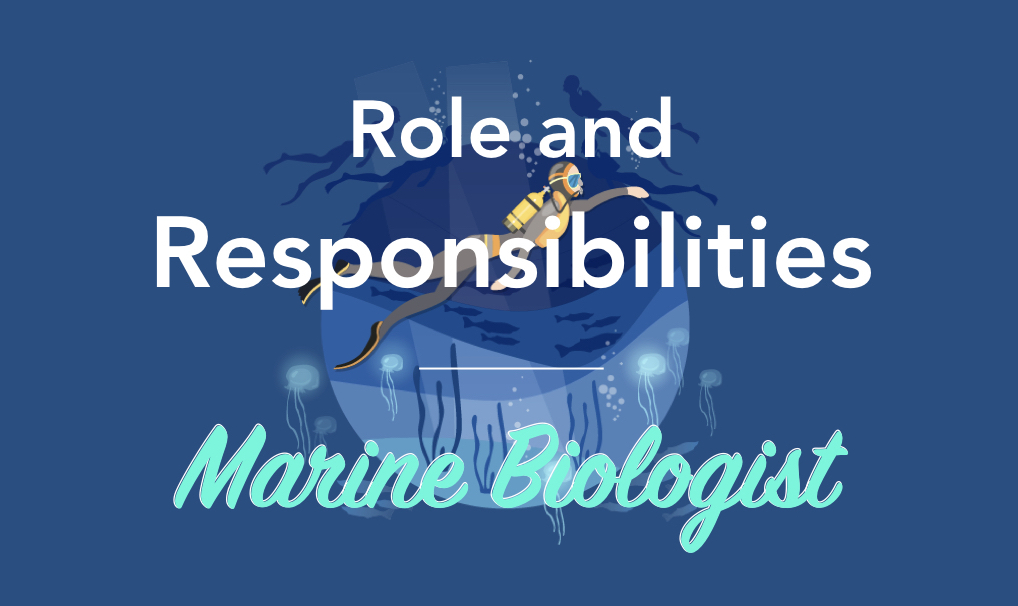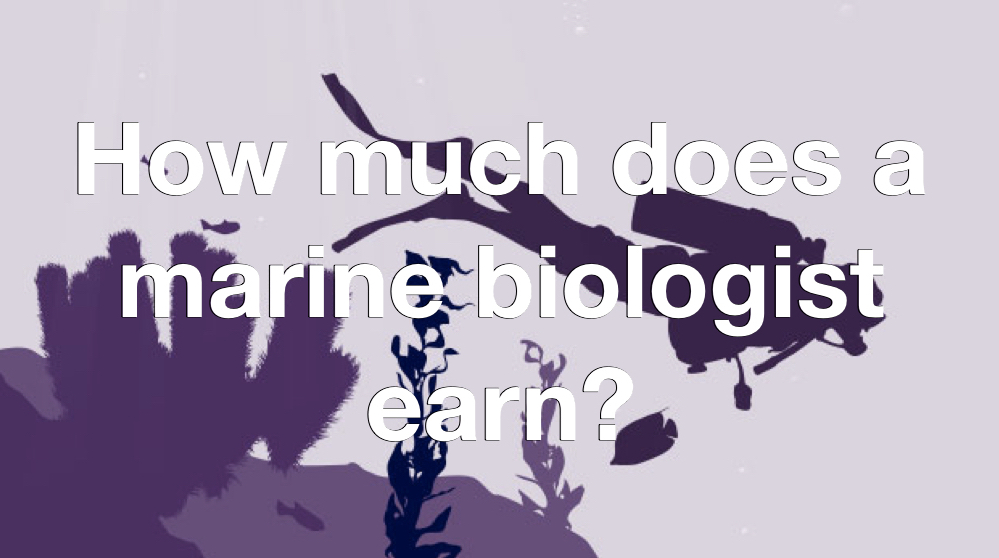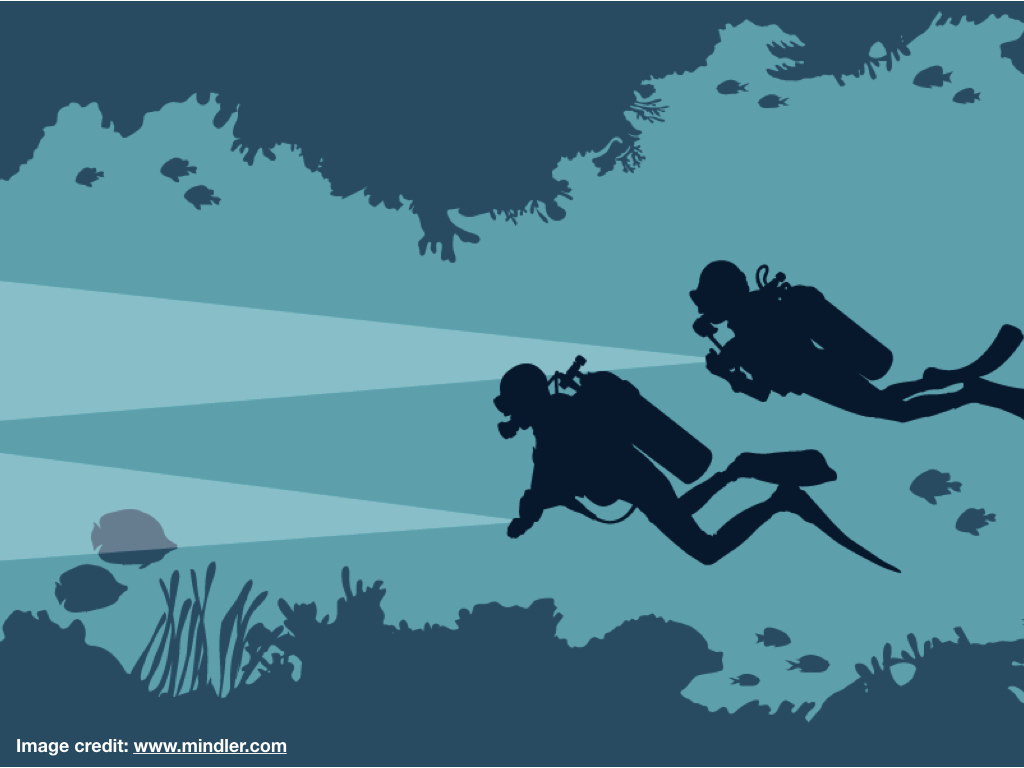A marine biologist is an expert on the ocean and aquatic life, investigate their biological and psychological process, behavior and interaction with an environment.
In fact, they study everything that is associated and related to sea and sea life.
Do you know?
- Marine biologists earn approximately $69,360 yearly working with government and national agencies.
- The sea has 99% of places for life to live in which approximately 50 to 80% of various species are living.
- ~ 2 million to ~50 million species or life in the sea is yet not identified, classified or studied.
- As per WoRAM- world register of marine species, 2,26,408 species from the ocean are studied and classified.
- Most of the volcanic activities occur in the ocean, scientists believe that the first life on earth was evolved in the sea.
In general, marine biotechnologists, marine wildlife experts, fishery biologists, marine habitat experts and conservation biologists are marine biologists who work for the organism, habitat and other non-living things present in a sea.
They study the sea organisms, their territory, their behaviors, industrial influence on marine life, their evolution, genetics, biology and other related things.
A professional doctoral degree is a requirement to be a marine life expert or scientist and can earn a decent amount of money. A fellow gets jobs mostly in coastal and sea areas, government marine life research centers, zoos and museums.
In the present article, I will explain to you what a marine biologist is and how to become one of them, what are the educational requirements, jobs, responsibilities, opportunities and one of the important things related to them. We will also discuss how much they can earn.
Don’t skip anything read to end. Let’s start the article;
What is a marine biologist?
A specialized field of biology focused on marine or ocean life is our marine science that requires aspirants who are experts in studying the same.
Marine science is itself a huge field of research that studies varieties of life, habitat and structure. It comprises the studies of pollution, industrialism, population, chemicals and other things on the ocean.
It is not only studying ocean life but also explains its importance and values to people. Experiments on marine biology tell us about the life of organisms in the sea. The field of science also studies the economical importance of aquatic creatures and their preservation.
Definition:
“A marine biologist is an expert in sea biology and life who studies organisms living under the sea, their biology, interaction with the environment, their habitat and their importance for other life forms.”
Roles and responsibilities:

A marine biologist can work in one of the three broad sectors; government sectors, wildlife or fields and research. Based on what profession they choose, their responsibilities vary, consequently, their roles also differ too.
Note that initially, they have a broad range of responsibilities, as their experience, educational achievements and experience on one topic increases they get higher recognition.
Their roles get narrowed as they work more, for example, those who worked for years on aquatic mammals and have a doctorate dissertation on it, have to work on that only.
Their responsibilities are to study sea mammals, their migration pattern, genetics, biology, disease, environmental interaction and conservation.
I have classified the roles and responsibilities of a marine biologist based on the career they choose.
Read more: 11 Reasons why to Study a PhD?
Government sectors:
At government sectors or agencies they look after critical factors like how adversely industries around the marine system influence it.
Aware authorities on climate change or adverse effects on various projects or industries and advise them to take necessary steps against it.
Make policies, laws and protection SOPs for marine life conservation.
Also regulates the unauthorized use of natural sea resources.
Monitor the fishing activities and smuggling of natural aquatic resources.
In close coordination with the state or central government bodies, they conduct, monitor and report the conservation of endangered aquatic lives.
Fieldwork:
Every marine biologist should have to work in the field during their initial period of work, although some choose to work in the field for the rest of their work tenure as it will be their interest.
- In the fieldwork, they work at actual aquatic sites, monitoring the activity of humans, other wildlife and marine life there.
- Closely monitor the activity of all aquatic organisms.
- Evaluate the effect of various pollutants on sea life.
- Collect samples for biological testing and study.
- Map and collect the geological information of various species
- Study the behavior of endangered species
- Dive deep into the sea for sample collection, survey and studying endangered species.
- Collect all primary ‘on-site’ information related to marine biology and aquatic habitat and life and deliver it to marine scientists.
Marine scientists:
Much like other biologists, the role and responsibilities of a marine scientist is to perform experiments in the lab and evaluate results for the same.
What makes marine scientists different from other marine biologists is their knowledge of handling instruments, conducting experiments, knowledge and experience of different tools and techniques and computation knowledge.
Their roles are enlisted here:
- Processing of biological samples
- Testing hypothesis and theorems
- Preserving biological data and species for future use.
- Reviewing existing research and publishing reviews
- Preparing research proposals and availing grants for organizations
- Preparing projects in order to benefit fishermen, wildlife and government as well.
- Evaluate outcomes and perform statistical analysis.
- Also, publish research work to benefit other scientists.
Note: All marine biologists have to spend an initial period of their work in the field at least for a few years.
Academicians:
Only working in fields or research labs isn’t the responsibility of marine biologists, they can work in academics too as various positions are reserved for them in colleges and schools.
- At academics, they have to teach students, other researchers and PhD students
- Deliver lectures
- Conducts and organizes lab sessions and field visits, respectively.
- Improve the present knowledge.
- Prepare future biologists.
- Prepare them for research methodology and research work.
- Do other academic work as well.
- Usually, in academics, they are working as a professor, lecturer or teacher.
Other responsibilities:
- Monitoring environmental issues and how it affects the aquatic ecosystem.
- Providing guidance and cooperating coast guards in their activities.
- Designing and conducting programs to monitor and eliminate pollution especially water pollution.
- Research to rebuild damaged ecosystems.
- Use of computer modeling and computer 3D modeling for getting predictive data.
- Track, measure and map sea organisms using various instrumentations.
- Preparing and presenting policies to stakeholders
- Educating and awarding the public about marine biology and related issues.
Related article: How to become a Doctoral Candidate?- 12 Recommendations.
What are the educational requirements?
Bachelor’s degree and master’s degree are entry-level requirements for entering the field. They typically work in organizations, companies and in the field with senior scientists and don’t have much experience.
However, to become a scientist or actual marine biologist, a prospective candidate needs a more advanced degree like a professional doctorate or PhD in marine science or marine biology.
Noteworthy, prospective candidates should have a wildlife or biology background to get the degree. They also have to study other subjects like statistics, mathematics or physics as well.
Several government authorities seek common entrance tests to avail jobs for marine biologists.
Typically a doctorate degree or PhD in marine biology is needed to become a marine biologist of any type. Master’s degree and/or common entrance test or MPhil is required to enroll in the PhD.
A minimum bachelor’s degree and a maximum of PhD degree is the educational requirements for becoming a marine biologist.
What are the requirements to be a marine biologist?
The present position isn’t generalized, one should require more than educational degrees.
Apart from the doctorate, aspirants need to learn swimming and scuba diving, as it is a part of their daily work. Only authorized diving certifications are valid to work.
A general fitness certificate is needed showing that the person isn’t suffering from respiratory problems like asthma.
The prospective scientist also has to work as an intern at various marine science research organizations, field sites or companies to gain substantial experience in their field.
In addition to this, a fellow should have critical analytic thinking, quick decision power, out of the box thinking abilities, physical and mental strength and observation power.
What are the types of the marine biologist?
As we said, marine biology is a vast field covering many subjects, especially for aquatic life. Henceforth, based on the responsibilities and role they perform, there are different types:
Here are some job titles:
- Marine biologist
- Fish and wildlife biologist
- Aquatic biologist
- Fisheries biologist
- Conservation biologist
- Marine zoologist
- Marine ecologist
- Reef operational project manager
- Scientist in marine biology
- Marine biotechnologist
- Marine geneticist
- Marine microbiologist
- Technician in marine biology
Marine biologist: The overall job of the marine biologist is discussed somewhere in the article. Comprehensively, their role is to study marine life, aquatic habitat and other related things.
Fish and wildlife biologist/ Ichthyologist: They perform duties to study various types of fish, classification, characterization, biological processes and other related things. Developmental patterns, reproductive habits, behaviors and related problems are studied too.
In addition to this, diving into the deep sea, collecting samples, measuring species and recording data are other duties they perform. They study wildlife in the sea, broadly.
Marine ecologist: Roles ecologist performs at various organizations are to study aquatic life and their relationship and interaction with ecosystems. They study the overall aquatic ecosystem, how to improve it and what other abiotic and biotic factors influence it.
Reef operational project manager: The operational project manager administers the entire project conducted by either government or organization on a particular aquatic site and takes care of the entire process and outcomes.
Scientist in marine biology: marine scientist or scientist in marine biology (actually not work at the real site), performs different experiments to improve the ecosystem, life and other crucial factors associated with aquatic life. They perform all kinds of experiments in the wet as well as dry lab.
Marine biotechnologist: Marine biotechnologist isn’t a specialized post yet, they study marine life to use it in industries for various purposes. Their role is to find out economically important aquatic organisms.
A huge portion of marine life is economically beneficial using aquaculture techniques such organisms can be grown for the production of food, cosmetics, pharmaceuticals, drugs and fuel.
Seaweed farming, extracting drugs and other secondary metabolites and treating cancer like problems are major goals for marine biotechnologists.
Marine geneticist: Marine geneticist is an expert of aquatic organism genetics whose role is to study DNA, gene or chromosomes of organisms (plants, animals or even prokaryotes) present in the sea. They work in research labs.
Noteworthy, the marine geneticists are actually experts in biological science or genetics, he or she isn’t a true expert of aquatic biology. However, they need some formal training in some cases.
Marine microbiologist: Much like marine geneticist or biotechnologist, roles the marine microbiologist performs are to study microorganisms present in aquatic habitat. Again, he or she isn’t a true marine science expert.
Like biotechnology, the applications of marine microbiology is to culture aquatic organisms, use them for cosmetics, food supplements, feed and other benefits.
Technician in marine biology: Technicians are junior scientists or interns performing various functions to support the senior scientist and help them during fieldwork and experiments.
Aquatic biologist: Alike marine biologist aquatic biologist studies organisms from streams, ponds, lakes, rivers and oceans. Their roles are somehow similar to marine biologists.
Aquarists: are the specialized trained professionals who take care of the aquarium and life under it. Although they aren’t usually doctors, they perform functions like feeding, observing, treating injuries and evaluating the overall health of fishes and other organisms present in aquariums.
They also fix damaged instruments, as well as educate consumers how to use and maintain aquariums.
Conservation biologists: they take care of the life and biodiversity of the aquatic ecosystem. The conservation biologist studies aquatic life and their interaction with humans, how biodiversity is influenced by human interference and how to restore it.
They take preventive measurements to preserve present species as well as plants to restore and preserve endangered specieses.
Marine mammalogist: comprehensively marine mammalogist studies the entire marine life or one present in aquatic habitat. Several specializations are; manatees, pinnipeds (sea lions, walrus and seals), cetaceans (porpoises, whales and dolphins) and other aquatic mammals like sea otters.
Notably, they work in varieties of places from field to laboratory and from government organizations to NGO who study anatomy, physiology, ethology, taxonomy, classification, ecology and history of sea mammals.
Professor/ teacher in marine science: educators work in academics, however, it doesn’t mean that they have never done fieldwork. Educating, teaching, awarding and preparing aspirants in the field are roles a professor has to perform.
Read more: How to become a Geneticist: Degree, Requirements, Jobs and Salary.
Note:
“Marine biologist” is an umbrella term used for those who are studying or doing research on marine or aquatic life, ecosystem or habitat. They might have obtained their degree in other biological fields possibly. For example, an ecologist, who is an expert of aquatic ecosystems, also referred to as a marine ecologist or broadly marine biologist.
How to become a marine biologist?
The process of becoming a marine scientist or biologist is a bit different than becoming other types of biologists. Biologists like cell biologists, molecular biologists or microbiologists need a PhD degree, some publication and research experience to enter their field.
However, besides an educational degree other skills, technical modules and expertise are also needed.
A journey to becoming an expert in aquatic life, especially marine scientist starts from the bachelors.
Prospective candidates need to study biology or related subjects like zoology, botany or marine biology. Biology or related interdisciplinary degree in bachelors and masters required to pursue higher studies for marine biologist.
After getting a master’s degree, an aspirant can either go for PhD/doctorate, MPhil or internship. Note that three can be benefits in the future, unless it is in marine science.
The prospective candidate can study PhD or doctorate and publish their work after completing.
Soon after, the candidate starts their job, internship or training in marine science. One thing to note that, before going to real field work other secondary skills are required.
Marine biologis’s jobs are though, with educational qualifications they need some extra preparations and skills to achieve.
A candidate needs scuba diving certification, swimming certification and general medical certification to work in the oceans.
Besides, a candidate should have to prepare mentally and physically. Also they have decision making power, leadership and strong mental status to become a marine biologist.
Here is the roadmap:
- Step 1: get a bachelors and masters’ degree in biology or related applied field.
- Step 2 A: Apply for PhD/doctorate or MPhil.
- Step 2 B: do internship with a marine biologist
- Step 3: Publish some work and get substantial experience.
- Step 4: get certifications diving, swimming and medical certifications.
- Step 5: get a job, internship or start field work.
Note that the fellow must be medically fit to work in the field or underwater. They do not suffer from any respiratory or lung disorders as they have to work under water pressure.
So far we have discussed many things to become a marine biologist, if you wish to go with this career option, i hope this helps you. Now coming to the important section of the present article. The earning/salary of marine biologist, how much they can earn?
Let’s find out
How much does a marine biologist earn?
As per the data of environmental science. Org the average salary or earning of a marine scientist is approximately $62,610 yearly or $30 per hour. Although the average wage may vary based on experience, position, expertise, organization and work, they are doing.

Marine biologists can earn starting from $24,000 to $92,400 or more in a year.
In the UK, they can earn from 12,000 euro to 1, 20,000 euro per year.
In India, marine biologists can earn ~3,00,000 to 6,20,000 INR yearly, note that no specific job positions are reserved for them, any biology graduate can apply.
Salary of some popular marine biology post are:
| No. | Post | Salary per year |
| 1 | Marine biologist | $62,610 |
| 2 | Marine ecologist | $54,912 |
| 3 | Marine mammalogist | $63,420 to $1,02,830 |
| 4 | Ichthyologist | $62,290 |
| 5 | Professor/ teacher | $52,525 to $94,008 |
| 6 | Marine scientist | $77,170 |
| 7 | Conservation scientist | $62,600 to $1,21,335 |
Note: this amount is approximate and/or average of persons working in various places (who are marine biologists). The data is taken from various sources from the internet. Numbers may vary based on many factors.
Utilities marine scientists uses:
Boats, traps, sonar devices, scuba gear, video equipment, computers, robotic instruments, nets, fishing rods, swimming suits, oxygen bottles, vessels.
What are the workplaces for marine biologists?- job description
There are several questions related to the present section, what are the workplaces for marine biologist, where marine biologist works or what are the job options? Here is the answer given for every question.
As I told you, marine science itself is a huge field of biology, experts have to look after many issues ranging from habitat to ecosystem and endangered species to preserving existing one.
Henceforth, aquatic fields to laboratory and government departments to academics divert workplaces for them. It is important to discuss this question as well to know, once you become one of them, possibly where you have to work which gives you an idea whether you are comfortable with that or not, consequently.
Traveling, campling and living in the wild are common for them and is a part of their daily life. Open oceans, mangroves, coral reef, swamp water, tide pools, rivers and other aquatic habitats are their workplaces.
They travel to the end of the country or to another country to reach marine life and study them. To do so they travel, camp in ‘no man’s lands’, prepare food by themself and sleep under the sky.
Note that, every marine biologist passes a major portion of their life in fieldwork.
Another popular workplace is a research lab where they do experiments on wildlife and aquatic life. Those labs are microbiology, biotechnology, genetics, clinical research lab, physics lab or biochemical labs.
Other workplaces are NGOs working on marine biology, Environmental protection agencies, government departments and agencies, colleges, research organizations, private companies, pharmaceuticals and clinical trials.
Read further: PhD in USA- Admission, Process, Universities, Salary and Jobs.
Conclusion:
Marine biology is an excellent career option, undoubtedly but for those who love outing and travelling with biology. Along with educational degrees like PhD, one also needs to have other skills that we have discussed somewhere in the article.
Plenty of career paths are available for the marine biologist. They can choose one as per their interest. With their outstanding achievements and findings the fellow can earn worldwide acknowledgement and privilege too.
Keep in mind that choosing this biological science is a bit challenging as a candidate has to endure extra skills and work in adverse conditions in the wild.
Those who love challenges, biology, research and deep diving, trust me this field is for you.
Some common FAQs:
Who is a marine biologist?
Marine biologist is a doctor or PhD working with the aquatic ecosystem, marine organisms associated field. They work in improving ecosystems and marine life and protect endangered species.
Are marine biologist doctors?
Strong yes, senior marine biologist, marine scientists and experts are PhD or doctor in biology or applied degree holders. Note that junior technicians and interns are master’s or bachelor’s degree holders.
How long does it take to become a marine biologist?
It takes 3 to 5 years for completing PhD or doctorate degree in PhD, henceforth if include undergraduate and graduates it takes around 9 to 10 years (3 years undergraduate), 2 years post graduation, 1 year MPhil or internship and 3 to 5 years of PhD.
Much like other PhD degrees the time duration of getting a degree in marine biology is the same.




